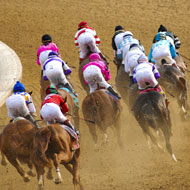
Huge improvement in race winning speeds since 1850
Despite the general consensus that racehorse speed has plateaued, racehorses are getting faster, new research by the University of Exeter has found.
In the study, researchers analysed data from over 600,000 races run by more than 70,000 horses. They found that race winning speeds have improved greatly since 1850, and increases in speed have been greatest in shorter distance races.
Data from 1996-2012 reveals that the improvements in performance are on-going, despite increases in handicap weight, and continue to be driven largely by increases in speeds of sprinters, especially at the elite level.
Previous studies of racing times concluded that thoroughbred racehorses may have reached the limits of their abilities. However, these studies only analysed the winning time of a small number of middle and long distance elite races and did not take factors such as ground softness into account.
Patrick Sharman from the Centre for Ecology and Conservation at the University of Exeter explains: “There has been a general consensus over the last 30 years that horse speeds appeared to be stagnating. Our study shows that this is not the case and, by using a much larger dataset than previously analysed, we have revealed that horses have been getting faster.
"Interestingly, both the historical and current rate of improvement is greatest over sprint distances. The challenge now is to find out whether this pattern of improvement has a genetic basis.”
The study, Racehorses are getting faster, by Patrick Sharman and Alastair Wilson, is published in Biology Letters.



 The Animal and Plant Health Agency (APHA) has updated its online reporting service for dead wild birds.
The Animal and Plant Health Agency (APHA) has updated its online reporting service for dead wild birds.